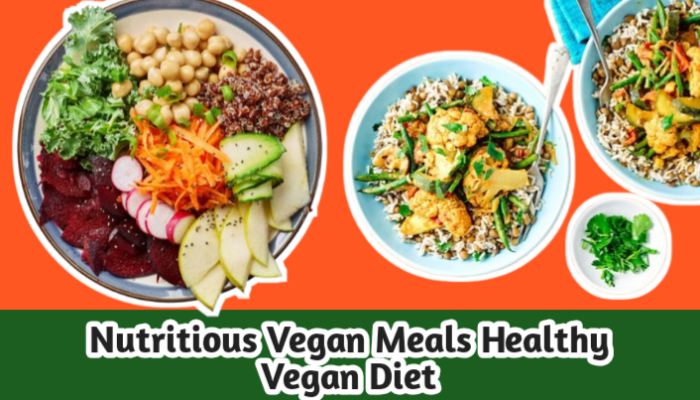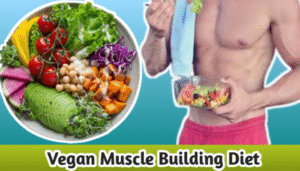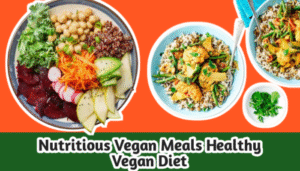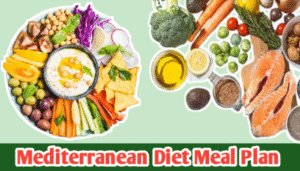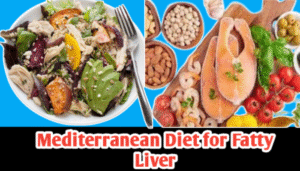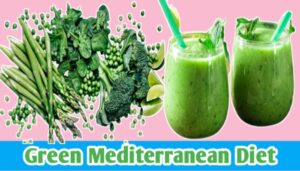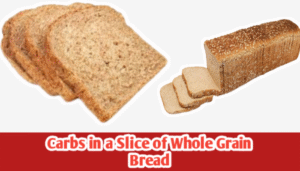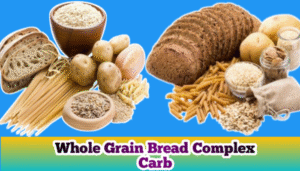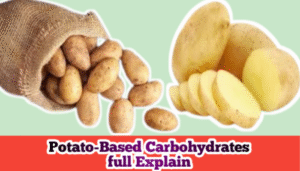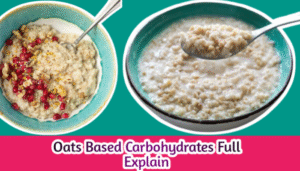Nutritious Vegan Meals Healthy Vegan Diet Adopting a vegan diet isn’t just about avoiding animal products—it’s about choosing nutrient-dense, plant-based foods that nourish your body and support overall well-being. A well-planned vegan diet provides the energy, vitamins, minerals, and macronutrients your body needs for optimal health, vitality, and longevity.
From colorful vegetables to protein-rich legumes and wholesome grains, a healthy vegan diet can help you feel energized, maintain a healthy weight, and improve your long-term health.
1. Benefits of a Healthy Vegan Diet
A nutrient-rich vegan diet has multiple benefits that go beyond ethics or environmental concerns. Here’s a detailed breakdown:
1.1 Weight Management
- Plant-based diets are naturally lower in calories and saturated fats, helping in maintaining or losing weight.
- High fiber content in vegetables, fruits, and whole grains promotes satiety, reducing overeating.
1.2 Heart Health
- Vegan diets are rich in antioxidants and unsaturated fats which help reduce cholesterol and blood pressure.
- Regular consumption of legumes, nuts, seeds, and whole grains reduces risk of cardiovascular disease.
1.3 Digestive Health
- High fiber intake from vegetables, fruits, and whole grains supports gut health.
- Fiber aids digestion, prevents constipation, and feeds beneficial gut bacteria.
1.4 Reduced Inflammation
- Plant foods contain antioxidants and phytonutrients that fight inflammation.
- Reduces risk of chronic diseases like diabetes, arthritis, and heart conditions.
1.5 Environmental Impact
- Choosing a plant-based diet reduces carbon footprint and conserves water and energy resources.
2. Common Misconceptions About Vegan Diets
- Myth: “Vegans can’t get enough protein.” ✅ Reality: Beans, lentils, tofu, tempeh, quinoa, and nuts provide sufficient protein.
- Myth: “Vegan diets are boring.” ✅ Reality: Colorful meals with grains, legumes, and veggies are flavorful and diverse.
- Myth: “Supplements are always necessary.” ✅ Reality: Whole foods cover most needs; only B12 and sometimes Vitamin D are essential.
3. Essential Nutrients for a Balanced Vegan Diet
For a healthy vegan diet, focusing on macronutrients and micronutrients is crucial. Here’s the breakdown:
3.1 Protein – Building Blocks of the Body
- Role: Supports muscle repair, hormone production, and overall growth.
- Sources: Lentils, chickpeas, black beans, tofu, tempeh, seitan, quinoa, nuts, seeds.
- Tip: Combine legumes + grains for complete amino acid profile.
3.2 Carbohydrates – Energy for Daily Life
- Role: Main energy source for body and brain.
- Sources: Brown rice, oats, quinoa, sweet potatoes, whole grains, fruits, and vegetables.
- Tip: Prioritize complex carbs for sustained energy and simple carbs around workouts or high-energy activities.
3.3 Healthy Fats – Hormone Support & Cell Health
- Role: Supports hormone production, brain function, and vitamin absorption.
- Sources: Avocado, nuts, seeds, olive oil, coconut oil.
- Tip: Include Omega-3s from flaxseeds, chia seeds, walnuts, or algae oil.
3.4 Fiber – Digestive Health
- Role: Improves digestion, maintains blood sugar levels, and supports gut microbiome.
- Sources: Whole grains, fruits, vegetables, legumes, nuts, seeds.
4. Top Plant-Based Protein Sources
- Lentils: 18g per cup (cooked)
- Chickpeas: 15g per cup (cooked)
- Tofu: 20g per 100g
- Tempeh: 19g per 100g
- Seitan: 25g per 100g
- Quinoa: 8g per cup (cooked)
- Nuts & Seeds: Hemp, chia, almonds, peanuts
5. Vitamins and Minerals Crucial for Vegans
Micronutrients are essential for health and energy.
5.1 Vitamin B12
- Role: Supports nerve function, energy, and red blood cell production.
- Sources: Fortified plant milks, nutritional yeast, supplements.
5.2 Iron
- Role: Vital for oxygen transport and energy.
- Sources: Lentils, chickpeas, beans, pumpkin seeds, spinach.
- Tip: Pair with Vitamin C-rich foods (oranges, bell peppers) for better absorption.
5.3 Calcium
- Role: Strengthens bones and teeth, supports muscle contractions.
- Sources: Fortified plant milks, tofu, tahini, leafy greens, almonds.
5.4 Zinc
- Role: Supports immunity and metabolism.
- Sources: Pumpkin seeds, cashews, lentils, quinoa.
5.5 Omega-3 Fatty Acids
- Role: Anti-inflammatory, supports heart and brain health.
- Sources: Flaxseeds, chia seeds, walnuts, algae oil.
6. Healthy Vegan Meal Planning Tips
Planning is the key to a balanced vegan diet:
6.1 Balance Macronutrients
- Ensure protein, carbs, and fats in every meal.
- Example: Lentil salad with quinoa and avocado.
6.2 Include Variety
- Eat different vegetables, fruits, grains, and legumes to cover all nutrients.
6.3 Meal Prep Strategies
- Prepare grains, legumes, and chopped vegetables in advance.
- Store snacks and protein-rich foods for busy days.
7. Nutritious Vegan Breakfast Ideas
7.1 Smoothies & Smoothie Bowls
- Ingredients: Spinach, banana, berries, almond milk, plant protein powder, chia seeds.
7.2 Oat-Based Recipes
- Overnight oats with soy milk, peanut butter, nuts, and fresh fruits.
7.3 Tofu Scrambles
- Sauté tofu with turmeric, spinach, peppers, and nutritional yeast.
8. Nutritious Vegan Lunch Ideas
8.1 Buddha Bowls
- Base: Brown rice or quinoa
- Toppings: Chickpeas, roasted veggies, avocado, tahini dressing
8.2 Protein-Rich Salads
- Mixed greens, lentils, pumpkin seeds, cherry tomatoes, lemon-olive oil dressing
8.3 Whole-Grain Wraps & Sandwiches
- Ingredients: Hummus, black beans, shredded carrots, spinach, whole-grain tortilla
9. Nutritious Vegan Dinner Ideas
9.1 Lentil or Chickpea-Based Dishes
- Lentil curry with brown rice
- Chickpea stew with vegetables
9.2 Stir-Fries with Tofu/Tempeh
- Tofu, broccoli, bell peppers, soy sauce, sesame oil over quinoa
9.3 Whole-Grain & Vegetable Combinations
- Barley or farro with roasted seasonal vegetables and pumpkin seeds
10. Healthy Vegan Snacks
10.1 Energy Bars & Balls
- Made with dates, oats, nuts, and seeds
10.2 Nuts and Seeds
- Almonds, walnuts, cashews, pumpkin seeds
10.3 Veggie Dips & Hummus
- Carrot sticks, cucumber, and celery with hummus or guacamole
11. Common Mistakes to Avoid
- Eating too many processed vegan foods.
- Skipping protein or essential micronutrients.
- Not consuming enough calories for energy.
12. Tips for Maintaining a Healthy Vegan Diet Long-Term
12.1 Track Nutrients
- Use apps or journals to ensure you get protein, iron, B12, calcium, and omega-3s.
12.2 Avoid Processed Vegan Junk Food
- Minimize sugary vegan snacks, fried foods, and vegan “meats.”
12.3 Stay Hydrated
- Drink water, herbal teas, and smoothies for hydration and nutrient absorption.
12.4 Experiment and Enjoy
- Try new vegetables, grains, and legumes. Make meals colorful and flavorful.
12.5 Social Support
- Join vegan communities for recipe ideas, support, and motivation.
13. Conclusion
Nutritious Vegan Meals Healthy Vegan Diet a well-planned vegan diet is nutrient-dense, versatile, and health-promoting. By focusing on macronutrients, essential vitamins & minerals, and colorful plant-based meals, anyone can thrive on a vegan lifestyle while maintaining energy, vitality, and long-term health. Eating nutritiously doesn’t have to be complicated planning, variety, and whole foods are the keys to success.
